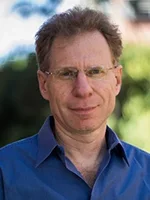Chair's Corner
Get to Know the Human Genetics Department Chair

U Magazine Spotlight Interview with Leonid Kruglyak, PhD
Dr. Leonid Kruglyak is a leader in the quest to understand how changes in the genome are shaped by molecular and evolutionary forces and how these changes lead to all the observable differences among individuals within a species. His research, using the gene-editing tool CRISPR, has helped to pinpoint regions of the genome that play key roles in common diseases.
When did you begin to think about science?
If you asked me in second grade what I wanted to do, I would have said I want to be a scientist. I was interested in math and science, but what I was really interested in first was astronomy and astrophysics and the solar system and the planets. My interest began as soon as I realized there is a bigger world out there and that people have been trying to understand how it all works.
What was your first experiment?
Anything that I did experimentally when I was a kid generally was a total failure. For a science project in high school biology, I was going to investigate the effect of acid rain on plants. I had these plants, and I was going to water them with solutions with different acidity. But I think I wasn’t very good at watering any of them and so they all died, which made it hard to see any results.
Who is your science hero?
Gregor Mendel. I’m a geneticist, and he is the founder of genetics. I feel that a lot of the questions we ask today are exactly the same questions that he asked back in the middle of the 19th century.
Where are you happiest?
I really like being out on the trails in the Santa Monica Mountains on my mountain bike. I enjoy the combination of physical exertion and challenge and natural beauty.
What is your defining characteristic?
I’m extremely competitive. That runs through everything I do. It certainly translates into a desire to be first in science, to come up with a new idea and execute on it before anybody else does.
What are the qualities that go into being a great scientist?
Problem choice: What are you going to work on? You have to be able to recognize that it is a question that hasn’t really been addressed, that it is worth addressing and that the impact is going to be large. And, also, it has to be attainable. It can’t be the kind of problem where the answer is 50 years away.
What is your greatest virtue?
I have a pretty good recollection of what it was like for me to be at different career stages, and I remember how different folks higher up the ladder treated me and what I liked and what I didn’t like. I try to act toward others in ways that I would have appreciated when I was at that stage.
What is your greatest fault?
I am impatient and easily bored.
When don’t you think about science?
If I’m on my bike going downhill and the trail is technically challenging, then I’m definitely not thinking about science — or anything else.
To which superhero do you most relate?
I’ve watched all the Marvel movies, and I don’t know if there’s a specific superhero that I identify with, but it would definitely be the more human and vulnerable ones. It is hard for me to identify with the all-powerful ones like Superman.
Where does your inspiration come from?
A lot of it comes from conversations with members of my group and other scientists.
What is the best moment of your day?
I ride my bike to work, and the route I take drops down to the ocean and goes along the beach path for a while. When you’re riding your bike right by the ocean and the weather is beautiful — especially if it’s in January! — it’s pretty great.
What has been your biggest “aha” moment?
I saw a connection between [a problem I was trying to solve] and the fast Fourier transform, which is an algorithm used in engineering and physics. I saw that the computation I was trying to do in genetics was analogous to that. Once I saw the connection, I was able to write about 10 lines of code that solved the problem. When I first started to describe the results at conferences, people would be like, “Did you just say you can calculate this? That’s impossible.”
What music do you listen to while you work?
When I was in school, I would play rock music fairly loud while I was trying to do hard math. Now I need peace and quiet to concentrate.
Whom would you like to have at your dinner table?
Charles Darwin, Gregor Mendel and William Bateson, the English biologist who coined the term “genetics.” That would be one heck of a dinner party.